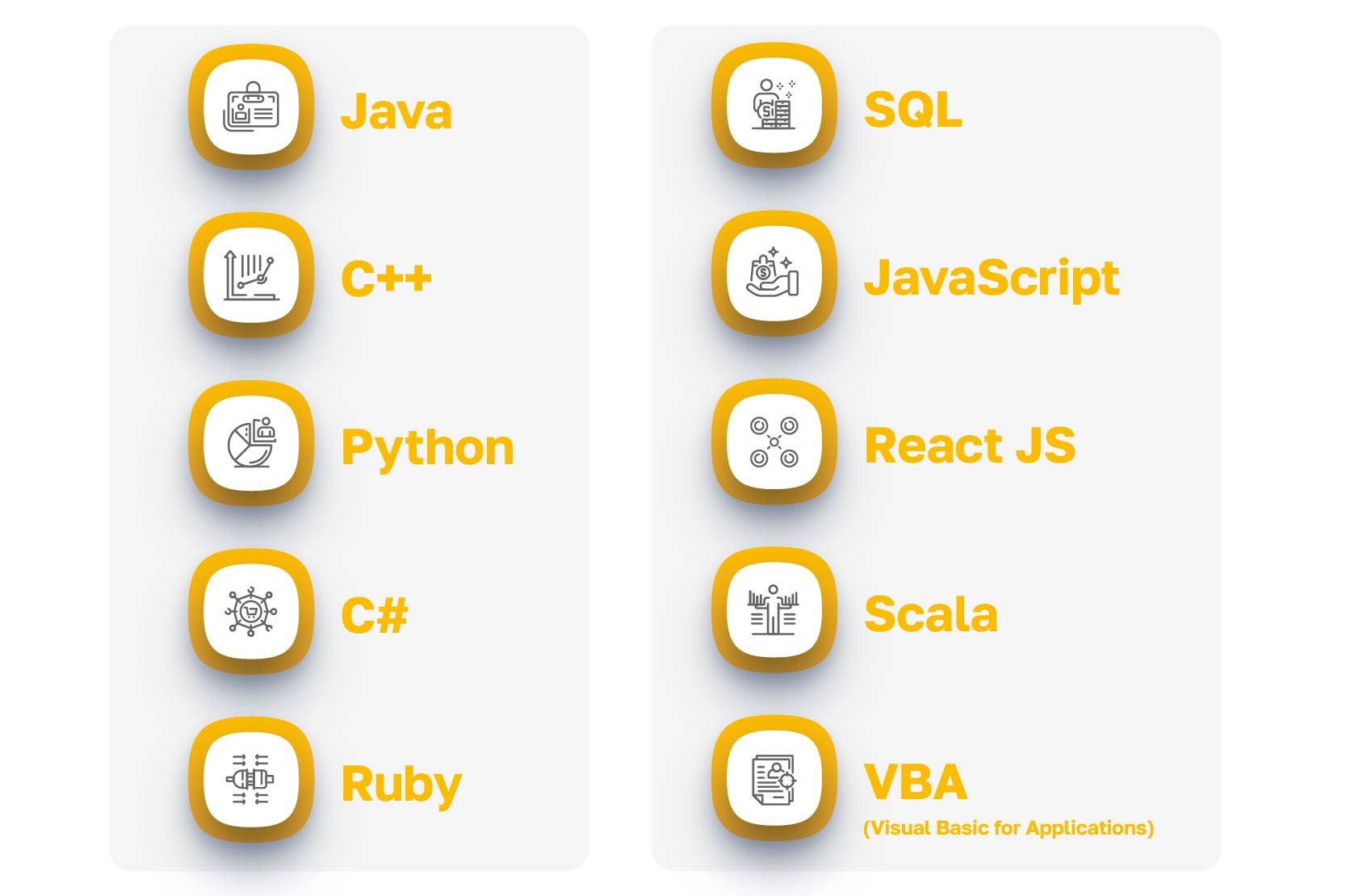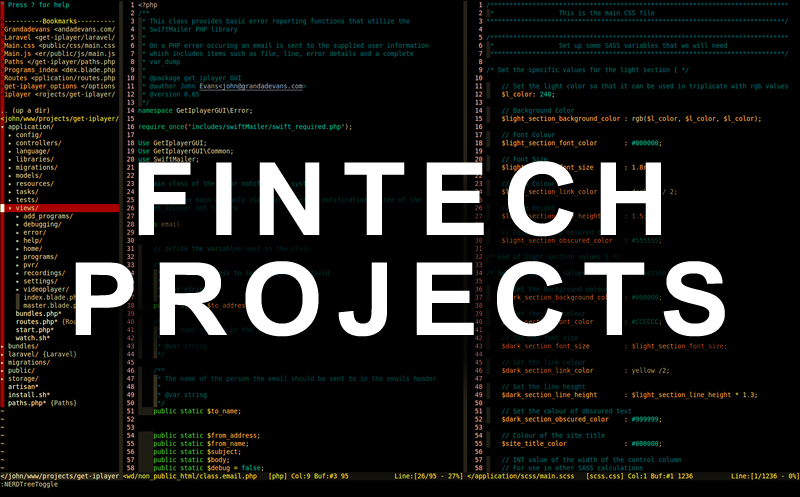Are you seeking the perfect programming language to bring your innovative financial technology project to life? Have you spent hours trying to make sense of development concepts and still have no clue which way to go? The vast sea of programming languages can seem bewildering and intimidating, leaving you feeling stuck and unsure.
With solid experience leading successful FinTech projects, we’re here to provide clarity and direction as your software development guide in selecting the most suitable programming language for your FinTech venture. Keep reading to learn about the best programming language for fintech projects!
Why Do Programming Languages Matter in Fintech?
By their nature, Fintech apps deal with highly sensitive financial data that requires the utmost security, reliability, and efficiency. The correct programming language can ensure these applications are secure against cyber threats. It can also ensure that the apps are capable of handling the high volume of transactions characteristic of the financial industry while providing a seamless user experience.
What Are Some Essential Characteristics for Any Fintech Programming Language?
Evaluating the main characteristics a fintech coding language should possess will help you find one that helps shape the future trajectory of a financial application’s success. Here are four essential factors that different programming languages must have to thrive in fintech:
#1 – Security
Appropriate programming languages must provide robust mechanisms for safeguarding data. This includes built-in features for encryption, secure authentication, and compliance with global financial regulations to protect sensitive information from breaches and ensure user trust.
#2 – Performance and efficiency
Fintech applications often process complex transactions and large volumes of data in real time. High-performance languages that optimize for speed and resource management can handle such demands, ensuring transactions are processed quickly and efficiently, leading to better user experiences.
#3 – Scalability
As fintech applications grow in user base and transaction volume, the programming language must be able to scale seamlessly. This involves support for continuous processing and efficiently managing increased loads without compromising on performance or user experience.
#4 – Ecosystem and community support
A vibrant ecosystem and active developer community are invaluable for a fintech programming language. They provide a wealth of libraries, frameworks, and tools that facilitate development, along with forums for troubleshooting and innovation. This support can significantly reduce development time and help keep the application up-to-date with the latest technological advancements.

The Top Programming Languages for Fintech Development
The ideal programming language for fintech should align with the project’s technical requirements and support rapid adaptation to the industry’s fast-evolving regulatory and security demands. Below are the top ten programming languages for finance tech projects:
#1 – Java
Java’s philosophy of “Write Once, Run Anywhere” (WORA) makes it a top choice in the fintech industry, where applications need to be reliable, scalable, and portable across various platforms. Its robust security features, extensive library ecosystem, and automatic memory management make Java ideal for building complex, high-volume transaction systems.
#2 – C++
Known for its superior speed and performance, C++ allows fintech developers to control system resources and hardware closely, making it ideal for high-frequency trading platforms. Its mature ecosystem and fine-grained control over memory and system processes enable building highly optimized financial software, making its use a consistent software development trend.
#3 – Python
Python’s simplicity and readability and a strong emphasis on rapid development have made it a favorite among fintech startups and established companies. Its extensive libraries, particularly for big data processing and machine learning, offer powerful tools for risk management, predictive analytics, and algorithmic trading applications.
#4 – C#
Leveraging the robust .NET framework, C# is a versatile language that balances simplicity and the advanced functionality needed for fintech applications. Its strong typing, comprehensive development tools, and integration capabilities make it suitable for creating secure, scalable financial services software.
#5 – Ruby
Valued for its elegant syntax and developer productivity, Ruby, particularly when paired with the Rails framework, is an excellent choice for fintech startups looking to rapidly prototype and deploy their apps. Its convention over configuration (CoC) and don’t repeat yourself (DRY) principles encourage writing less code and faster development, which is ideal for agile fintech environments.
#6 – SQL
SQL (Structured Query Language) is indispensable for managing and querying relational data processing platforms. Its powerful data analysis and manipulation capabilities are essential for handling transactions, user data, and analytics in virtually all financial applications.
#7 – JavaScript
JavaScript, unlike other programming languages, is essential for building interactive and responsive user interfaces in fintech platforms. Its event-driven, non-blocking model suits real-time applications like online trading, payments, and dashboards.
#8 – React JS
React JS is renowned for its efficiency and flexibility, making it a popular choice for fintech applications that require dynamic and responsive web interfaces. Its component-based architecture allows for the development of large, complex applications with data that changes over time.
#9 – Scala
Scala offers a blend of object-oriented and functional programming paradigms, providing a high level of expressiveness and enabling the creation of concise, type-safe code. Its compatibility with Java and emphasis on immutability and concurrency make Scala a strong candidate for complex, high-volume financial systems that require scalability and fault tolerance.
#10 – VBA (Visual Basic for Applications)
Often overlooked among the best programming languages for fintech, VBA remains a potent tool for automating financial models, algorithms, and processes within the Microsoft Office suite, particularly Excel. It’s invaluable for rapid prototyping and developing custom financial analysis and reporting tools in a familiar environment.

How to Choose the Right Language for Your Fintech Project?
Deciding on the most fitting programming language is a crucial step in the journey of fintech project development. It affects the project’s adaptability to future technological advancements and market demands. To navigate this choice, it’s essential to consider a framework that aligns with your project’s specific needs, potential scale, and the nature of the financial services you intend to offer.
Here are three steps to guide financial analysts in choosing the correct programming language for your fintech project:
Step 1: Define your project requirements and goals
Begin by thoroughly understanding and outlining your project’s core functionalities, performance expectations, and security needs. Consider factors like the expected volume of transactions, the need for real-time processing, and compliance with financial regulations. This step will help you identify the key features your programming language must support to thrive in the financial services industry.
Step 2: Evaluate the ecosystem and community support
Look for a language with rich libraries, frameworks, and development tools tailored to financial applications. An active and engaged community is also crucial for ongoing support, knowledge sharing, and finding solutions to development challenges. This step ensures the chosen language offers a solid foundation for building, testing, and scaling your fintech application.
Step 3: Consider long-term viability and developer availability
Consider the language’s track record in financial applications and its roadmap for future development. Additionally, factor in the availability of skilled developers proficient in the language, as this will impact your project’s development speed, maintenance, and future enhancements. Choosing a language with a large talent pool can facilitate easier recruitment and contribute to the project’s long-term success.

We Can Help You with All Aspects of Your Fintech Project!
Every choice in a fintech project carries significant weight. Making an ill-informed decision about foundational aspects, such as which of the programming languages mentioned to use, can reduce your project timeline and compromise its success. The stakes are exceptionally high since security and reliability are non-negotiable. Without expert guidance, these decisions can become overwhelming.
This is where WillDom comes into play. With our comprehensive software development outsourcing services, we take the guesswork out of your fintech project. Our team of experts is equipped with the knowledge and experience to make informed decisions that align with your project’s unique requirements and long-term vision.
Contact WillDom today, and let us guide you through the complexities of development for financial institutions!
FAQ
Yes, fintech typically requires coding, as it involves creating software applications for financial services. These applications range from mobile banking apps and payment systems to investment platforms and cryptocurrency exchanges. Coding is essential for developing the functionalities, ensuring security, and integrating various financial technologies that enable these services to operate smoothly.
Financial software development solutions can achieve various outcomes, including streamlined banking processes, enhanced customer experiences, improved fraud detection, and personalized financial advice. They enable businesses to offer innovative services like mobile payments, peer-to-peer lending, automated investing, and real-time analytics.
Financial software development services integrate technologies such as blockchain for transparent transactions, artificial intelligence, and machine learning for personalized financial insights. Financial algorithms also incorporate big data analytics for real-time decision-making and APIs for seamless integration with other banking and financial services.

